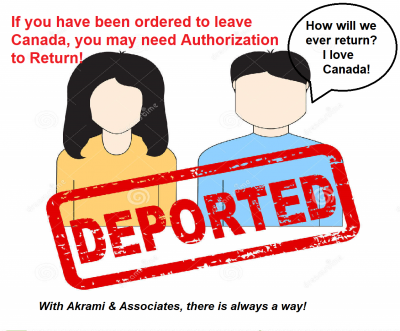Do You Need an Authorization to Return to Canada?
Have you previously been ordered to leave Canada, and are now wondering what this means for your ability to visit the country again? Being ordered to leave Canada is one of the many reasons an individual may be considered inadmissible to the country, and ultimately not be allowed to enter the country. You will know that you have been ordered to leave Canada if you receive a removal order from Canadian immigration services. If this sounds like the circumstances you face, there is good news! Akrami and Associates has plenty of experience evaluating the unique circumstances individuals may face, and helping each one solve their issue of being inadmissible to the country. Keep reading to find out if you will likely need an authorization to return to Canada (ARC), before you are permitted to enter the country again.
What Is an Authorization to Return to Canada?
An authorization to return to Canada (ARC) is a document any individual who has received a removal order from Canadian immigration services most likely needs, though, there are exceptions. In other words, an ARC is needed for any individual who travels to Canada and fails to comply with the requirements set out in the Immigration and Refugee Protection Act (IRPA). One can fail to comply with the requirements set out in IRPA by staying longer than the standard 6 months individuals are allowed to stay, or longer than is permitted according to their visitor’s visa in their specific circumstance. One can also violate IRPA regulations by working or studying in Canada while they are not permitted to do so, for example. Violating the regulations set out in IRPA do not simply trigger your removal from Canada, it is most likely that following this occurrence, you will require an authorization to return to Canada before you are allowed to enter the country. To be clear, you are often considered inadmissible to Canada if you violate the regulations of the IRPA. An ARC overcomes your status as inadmissible if you are inadmissible as the result of a removal order.



